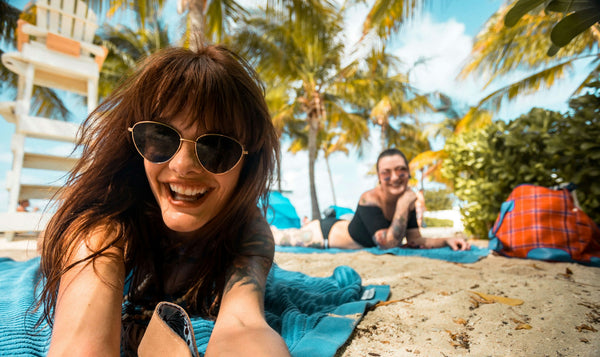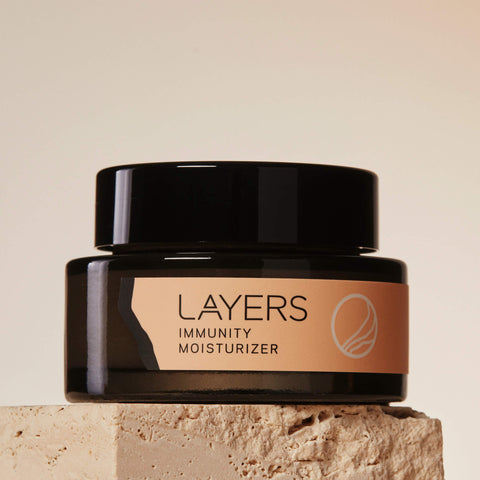Sun exposure is a tricky thing: our bodies need it to function, but too much of it can cause serious side effects. Learn how probiotics can help protect your body’s largest organ.

It’s summertime, and that means tank tops, summer dresses, and swimsuit season! It also means that whether we seek it out or not, our skin is exposed to lots of sun since we tend to spend more time outdoors. At this point, the risks of too much sun have been drilled into our heads. But did you know that probiotics can help bolster your skin's protective abilities?
But first, a PSA. Pushing your skin beyond its limits can cause not only discomfort, but often much bigger problems down the road. Here’s the lowdown.
The Risks of Overexposure
When you’re exposed to UV rays, your skin microbiome goes into protection mode. Those rays do have benefits, but overexposure can wreak havoc. The good news is that the stronger your microbiome defenses are, the better protected you’ll be.
It’s really important to understand the risks of too much sun- and take it seriously. Dehydration and sunburn are all possibilities if you’re under the sun for too long. According to the Environmental Protection Agency, Broadspectrum UV exposure not only visibly affects the skin, but it can cause detrimental long-term effects such as cancer and eye damage.
Broadspectrum refers to both UVA and UVB rays. These rays behave differently and we are exposed to them at varying levels. What’s the difference?
- UVA rays: Low energy, long wavelength rays that can penetrate through to the dermis, the middle layer of your skin. About 95% of sun exposure comes from UVA rays which are responsible for signs of premature aging and some types of cancer.
- UVB rays: High energy, short wavelength rays that don’t penetrate through the epidermis, the outer layer of your skin. These rays cause your skin to change color in the form of tanning, sunburning, and sometimes blistering. They cause damage at the DNA level and are linked to cancers like basal cell carcinoma, squamous cell carcinoma, and melanoma, a more serious type of skin cancer.
The Tough Truth About Tanning

Having a sunkissed glow has long been branded as a sign of good health. We all need that Vitamin D, right? But this golden image is unfortunately misleading. When your skin starts to change color under the sun, it’s actually a protective mechanism initiated by your microbiome to keep those rays from penetrating deeper.
In an article published by Harvard Health, Dr. Barbara Gilchrest, a dermatologist at Massachusetts General Hospital says, "A tan is a response to DNA damage. Some women may tan well for many years, but eventually the skin quality will change, become leathery, develop lentigines ["age spots"], and then coarse wrinkling."
Trust us, your future self will thank you for tossing your tanning habit now. However, there is a way to have your sunkissed cake and eat it too. How? Hit the bottle…the self-tanning bottle, that is. But be sure to opt for a safe, non-toxic self-tanning product. You can find a selection of tested brands here.
How Probiotics Help Protect Your Skin
We’ve covered the benefits of probiotics when it comes to protecting your skin from environmental stressors like air pollution. And we’ve talked about how topical probiotics can help your complexion feel healthier and more radiant. But the pros of these tiny microorganisms, fungi, and bacteria don’t stop there.

A healthy and diverse microbiome provides the best defense against ultraviolet radiation because it focuses on strengthening your defenses. One way to ensure microbial diversity is to take a daily probiotic. Our one-a-day Daily Glow Supplements are a great option because they contain Lactobacillus rhamnosus. This probiotic strain has been scientifically proven to prevent the development of tumors on the skin.
Results of the study indicated that “..the administration of a probiotic strain of Lactobacillus rhamnosus GG (LGG) was demonstrated to prevent the development of skin tumors thanks to the activity of its lipoteichoic acid (LTA), a component of the Gram-positive bacteria cell wall. In a murine model, LTA decreased UV-induced skin immunosuppression and thus significantly reduced UV-induced skin tumor growth.”
Additional studies evaluating the efficacy of Lactobacillus plantarum, another component of the proprietary blend in our daily probiotic, also show great promise when it comes to combating the effects of UV radiation, particularly when it comes to photoaging.
Sun Exposure and Your Gut Health
Now you know the consequences of too much of a good thing. Let’s talk about why the sun is still a “good thing”, as long as you’re not overexposing your skin. First of all, it’s our primary source of vitamin D, helping to regulate your gut microbiota.
It also acts as an anti-inflammatory and immune modulator within the gastrointestinal tract, keeping your gut in a state of balance. Studies have shown that people with bowel diseases, like IBD and IBS, have lower-than-average levels of vitamin D, making supplementation an effective way to help regulate these conditions.
Getting your recommended dose of sun-sourced vitamin D requires as little as 10-30 mins of exposure per day. Our bodies also get this all-important vitamin from the food we eat. Fatty fish like wild-caught salmon, halibut, and mackerel pack a punch. You can also supplement with Cod Liver Oil. Egg yolks, mushrooms, and fortified products like cereals are also tasty ways to top up on vitamin D.
How to Enjoy the Sun Safely

There’s no need to avoid the sun completely or cover every inch of your body all day long. If you have a good, full-spectrum SPF, just make that a part of your daily skincare routine. Yep- even in winter months and even on cloudy days. Those rays can get to you, no matter the weather or the season.
Reinforcing your skin barrier via the gut is a great way to bolster your overall protection. You can also just go ahead and swear off the tanning bed forever- it’s not worth the quick picture-perfect tan to knowingly cause potential long-term damage to your skin.
Here are a few more suncare tips to keep in mind:
- Use SPF every day. For the best protection, The American Academy of Dermatology says don’t even mess with anything under SPF 30. Find a brand that’s water resistant and reapply every 2 hours. Pro-tip: spray SPF is great for this because it’s easy to reapply and won’t ruin makeup.
- Get sunglasses with UV protection. Any pair of sunglasses worth the money should include UV-protection information. Look for polarized shades with 100% UV protection or UV400.
- Develop a hat habit. This fashion-forward tip is a great way to complete any look while also protecting the delicate skin around your face and eyes.
- Seek shade between 10 am-4 pm. These hours are when the sun’s rays are the strongest. Opting for shady spots will keep you cool and still allow you to take advantage of warm summer temperatures.
